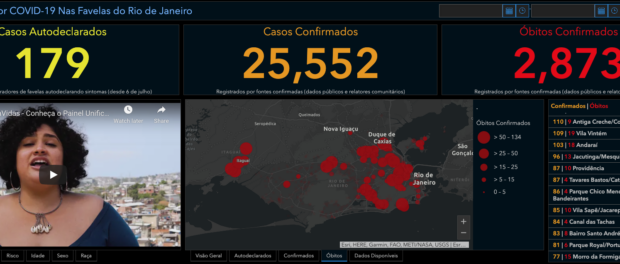
‘BEYOND INDIVIDUAL RESPONSIBILITY, WHAT IS THE ROLE OF GOVERNMENT TO CONTAIN THE SECOND WAVE? PUBLIC TRANSIT IN DEBATE’
Covid-19 in Favelas Unified Dashboard, entering its sixth month, to hold third press conference this Thursday, December 10, 5pm GMT (2pm Rio, 12 noon EST), in Portuguese.
Click here to register. FOR IMMEDIATE RELEASE [PDF]
December 8, 2020—Five months after launching the Covid-19 in Favelas Unified Dashboard (www.favela.info), and with public and private hospitals filled to capacity, civil society collectives from Rio de Janeiro once again denounce the lack of public policies to combat the new coronavirus. This time, focus is on the need for damage reduction initiatives, in particular for the throngs of citizens from across Rio’s metropolitan region who rely on public transport.
The Unified Dashboard, which over time has identified new sources of data on the reach of coronavirus in favelas, today reports 25,552 cases and 2,873 deaths in favelas in the metropolitan region, with 20,716 cases and 1,967 deaths in favelas within the municipality of Rio de Janeiro. Today, the Unified Dashboard represents 64.6% of favela households in the city of Rio.
On Thursday, December 10, International Human Rights Day, the 22 organizations, initiatives and collectives behind the Dashboard will hold a debate for the press and parliamentarians to present the coronavirus situation in peripheral territories and demand new urgent local policies to combat coronavirus contagion in favelas.
The Covid-19 in Favelas Unified Dashboard is realized through a highly participatory methodology that, given the current lack of mass testing in most communities, recognizes that data collected through a qualified local base are most accurate. Based on local sources, the Dashboard began building its database in July 2020 and is adding new sources each week. More recently, we incorporated a Zone of Influence by Post Codes (CEPs) methodology, identifying post codes that best reflect each favela, starting with the most populous ones. Thus, using CEP data, we have so far managed to cover 228 favelas, six of them in neighboring municipalities, in particular Itaguaí.
At this week’s press conference, held during the Dashboard’s sixth month, we will present concerning new data, the methodology developed for the project, and will hold a debate with favela leaders and community reporters about the role of public authorities at this moment of the pandemic’s re-peak. In addition, we will release access to detailed data underlying the Dashboard, as well as the technical report.
Agenda for the Third Press Conference of the Unified Dashboard:
- 2:00-2:05pm Introduction and release of public data on the Dashboard
- 2:05-2:20pm Presentation of the Dashboard’s methodology and release of the technical note
- 2:20-2:30pm Comparative presentation of the Unified Dashboard between July and December
- 2:30-3:00pm Debate with favela residents, leaders and journalists on: Is the second wave coming to the favelas? What are the current challenges? How to develop damage reduction policies around public transport?
For this press conference, presentations and testimonials from the following Dashboard members are confirmed:
- Amanda Scofano – PhD student at PUC-Rio
- Andressa Cabral Botelho – Maré de Notícias, Complexo da Maré
- Bia Carvalho – Mulheres de Frente, Mesquita
- Douglas Heliodoro – Peripheral Connections Collective, Rio das Pedras
- Elisa Maria Campos – Catalytic Communities
- Mariana Galdino – LabJaca, Jacarezinho
- Melissa Cannabrava – Voz das Comunidades, Complexo do Alemão
- Polinho Mota Junior – Data_Labe, Complexo da Maré
- Rafael Oliveira – Favela Vertical, Gardênia Azul
- Renata Gracie – Icict/Fiocruz
- Tânia Alexandre da Silva – Edson Passos Women’s Association (AMEPA), Cosmorama, Mesquita
- Theresa Williamson – Catalytic Communities
Some sad highlights of our situation:
- More deaths have already occured in the favelas of Rio de Janeiro than in 121 countries. Deaths in Rio’s favelas exceed those of Congo (344), Ireland (2099), Australia (908), Venezuela (924), Denmark (894), Mozambique (136), Thailand (60), Cameroon (443), Malaysia (388), and many others.
- More deaths have taken place across Brazil than those caused by the nuclear bomb at Hiroshima. In Brazil, we have confirmed records that the disease killed more than 177,000 people, while the bomb at Hiroshima, about 140,000.
- Brazil has the third worst official rate of contamination in the world and the second highest number of confirmed deaths, that is, people who were tested positive for Covid-19 while alive or after death. This despite severe underreporting and testing.
THIRD PRESS CONFERENCE DETAILS
WHEN: Thursday, December 10, 2020, from 2-3pm
WHERE: On Zoom. Press registration here. English interviews available (contact us).
IMAGES FOR REPORTING: Feel free to use these images shared by project partners, maintaining image name as basis for captions and credits.
CREDITS
Delivery and management: Catalytic Communities (CatComm)
Partners: A.M.I.G.A.S. | Centro Social Fusão | Coletivo Conexões Periféricas-RP | Covid por CEP | Data_Labe | Fala Roça | Favela Vertical | Fiocruz | Fórum Grita Baixada | Frente de Mobilização da Maré | Instituto Educacional Araujo Dutra | LabJaca | Maré de Notícias | Mulheres de Frente | Observatório de Favelas | PerifaConnection | Redes da Maré | SOS Providência | TETO | Voz das Comunidades | WikiFavelas
Development and updates: Esri – Environmental Systems Research Institute
Demographic Data: Prefeitura Rio and IBGE 2010
Integrating Technology: Integromat
Video: LabJaca (watch the Portuguese video here: video.favela.info)
#DadosSalvamVidas #DadosSãoPoder #Covid19NasFavelas #PainelUnificadorDasFavelas
CONTACT US
Unified Dashboard: press@catcomm.org
Facebook of the Unified Dashboard: fb.favela.info
